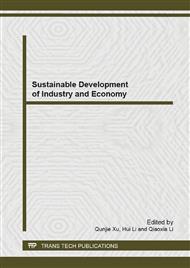p.660
p.665
p.670
p.676
p.683
p.691
p.698
p.702
p.706
Eco-Compensation for Coastal Principal Function Zoning in Xiamen Bay
Abstract:
Eco-compensation for Coastal Principal Function Zoning (CPFZ) is a novel and important research topic. This paper chooses the coastal area of Xiamen Bay as the study area, and attempts to research on the eco-compensation under the framework of CPFZ. At first, the paper discusses the connotation of eco-compensation for CPFZ, and points out that the main consideration should be given to two aspects: the compensation for losses of coastal ecosystem services caused by the leading industry, and the compensation for losses of the restricted or prohibited industries due to the leading industry priority. Then, based on the framework of CPFZ in Xiamen Bay, this article estimates the losses of ecosystem services caused by the leading industries and the corresponding eco-compensation amount, as well as the losses of the restricted or prohibited industries and the reference amount of the claim, using the valuation of ecosystem services combined with the expert judgment method, and the market price method, respectively. Finally, the compensation approaches and the relevant policy are suggested. This work will be helpful to promote the operability of CPFZ and provide reference for further related researches.
Info:
Periodical:
Pages:
683-690
Citation:
Online since:
December 2013
Authors:
Price:
Сopyright:
© 2014 Trans Tech Publications Ltd. All Rights Reserved
Share:
Citation:


